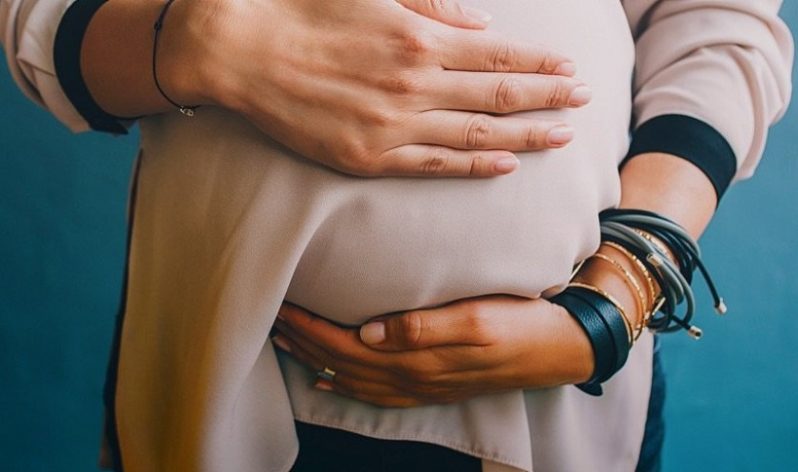-GPHC steps up efforts to protect Guyana’s mothers
SAFEGUARDING Guyana’s mothers and future will take extra effort, as pregnant women are listed in the “high-risk” population for the deadly Novel Coronavirus (COVID-19) disease.
Grappling with the effects of this disease has been tedious for everyone, but during this time of crisis, special care and attention needs to be placed on potential mothers, who are more at risk of feeling the brunt of COVID-19.
“Pregnancy is a physiological tumor so patients, who are pregnant, are in an immuno-depressed state, so they are in the high-risk population,” said Five-Year Resident of the Obstetrician-Gynecologist (OB/GYN) programme at the Georgetown Public Hospital Corporation (GPHC), Dr. Surujpaul Singh, during an exclusive interview with the Guyana Chronicle, on Tuesday.
According to the World Health Organisation (WHO), COVID-19 is an infectious disease caused by the newly-discovered coronavirus. While, the WHO said most people infected with the COVID-19 disease will experience mild to moderate respiratory illnesses and recover without requiring special treatment, persons with immuno-deficiencies and underlying conditions are more likely to develop the serious form of the illness.
The United States of America (USA)’s Centre for Disease Control (CDC) had said pregnant women have changes in their bodies that may increase their risk of some infections; and pregnant people have had a higher risk of severe illness when infected with viruses from the same family as COVID-19 and other viral respiratory infections, such as influenza.
Considering these possibilities, Dr. Singh advised pregnant women to take extra precautions and adhere to existing guidelines and advisories.
“They (pregnant women) should observe all the advisories out there and be a little more careful in terms of going to supermarkets and other crowded places. In fact, pregnant women, if they can, should avoid crowded areas.
“They should also avoid being in contact with persons, who would have tested positive for or is suspected to have COVID-19 or even persons who have respiratory symptoms. Avoid being around them,” said the doctor.
Potential mothers will, however, have to visit clinics regularly, but GPHC has already taken that into account and rolled out a menu of measures which are geared at ensuring that pregnant women and even babies are protected, every step of the way.
In walking Guyana Chronicle through the process, Dr. Singh said an isolation area has been identified for patients, who are suspected to have COVID-19. The room being used for isolation is the “old birthing room,” which already has the necessary equipment to conduct deliveries if the need arises.
The facility is manned by medical professionals, who have already been trained to handle suspected and even confirmed cases of COVID-19. The maternity unit has already dealt with suspected cases, but there has been no confirmed case.

“When pregnant women, who show symptoms of the disease, visit the unit, they are housed in the isolation area and we would call GPHC’s COVID-19 task force to evaluate the patient and take a sample, if necessary, for testing… if the test comes back negative, the patient remains with the normal population, but if the result is positive, all the care will be done in the isolation area,” said Dr. Singh.
He further explained that a COVID-19- positive pregnant woman, would deliver the baby in the isolation area and the postpartum care will also be done right there.
VERTICAL TRANSMISSION
As it pertains to the baby, Dr. Singh said there is no existing evidence that there could be vertical/mother-child transmission of the COVID-19 disease, but this has not been ruled out because COVID-19 is still unfolding.
“The disease is not found in the placenta or umbilical cord so vertical transmission does not seem possible right now, but it has not been ruled out…so with that in mind, the same isolation area has been divided to facilitate the babies. Babies, delivered by COVID-19-positive women, will be swabbed and tested,” said the doctor.
If the results of the test is negative, the baby will stay in the isolation area, but if he/she is positive, the hospital’s Paediatric Department will take over and observe the necessary protocols. Likewise, if the baby’s mother shows mild symptoms of the disease, she will stay in the isolation area, but if the symptoms are severe, she will be transferred to the COVID-19 Intensive Care Unit (ICU).
These measures, however, apply to “normal deliveries,” so if the woman has to do a Cesarean-Section (C-Section), she will be transferred to a special area so as to avoid contamination. The procedure will be supervised by a limited amount of persons, but the team will include senior personnel.
Dr. Singh said the hospital continues to do regular deliveries and has been delivering approximately 500 babies monthly, for the past three months.
As the unit continues to do its work, he is confident that the plethora of measures will be successful in containing the COVID-19 disease and even delivering adequate care to patients. He gave the assurance that everything will be and is being done to safeguard pregnant women and babies.
The safeguarding measures start from the entrance to the maternity ward, where persons are screened, sanitised and then granted permission to enter. Additionally, persons will only be allowed into the facility if they wear a face mask.
The maternity unit has also limited non-essential clinics in order to minimise the amount of persons visiting the hospital. In some cases, persons would just need to visit the hospital for their medication then return home. The clinics usually see 100 persons a month, but that has decreased to about 50.
While those measures will protect persons visiting the hospital, he reiterated that pregnant women need to adhere to the existing measures, in order to stay safe. He advised persons, who are experiencing symptoms of COVID-19, to call the COVID-19 hotline.
According to WHO, the most common symptoms of COVID-19 are fever, dry cough, and tiredness. However, it was keen on noting that some patients may have aches and pains, nasal congestion, sore throat and even diarrhoea.



.jpg)










